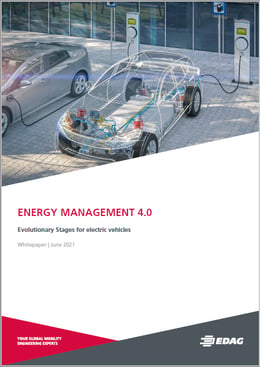THE FOUR EVOLUTIONARY STAGES OF ENERGY MANAGEMENT
eMobility is a vital element of the mobility of tomorrow and essential to achieve the climate targets that have been set to halt the present rate of climate change. Customers' wishes to help shape a climate-neutral future by means of eMobility are forcing the major OEMs to put all-electric vehicles or hybrid solutions onto the market. This development is being supported by the expansion of the charging infrastructure, and also by special incentive programmes intended to encourage people to buy electric cars.
One of the major challenges involved in the development of electric vehicle is energy management, generally regarded either as the management of the discharging currents of the lithium-ion battery, or from the point of view of hardware and thermal management. Capacity, current carrying capacity, temperature limits and other physical parameters are of key importance for the operating behaviour of an electric powertrain.
Customer perception is, however, determined mainly by the software-based control of the overall system, though the system boundaries extend far beyond the vehicle.
- adaptive algorithms
- cloud connection
- pattern recognition
- the digital twin of the battery cells
we embed the vehicle in the energy and load management of the future.
You can find out exactly how we do this and what you need to know about the evolutionary stages of energy management from our expert, Benjamin Mangold. Why not register now, and download our technical article "Energy Management 4.0 – Evolutionary Stages for Electric Vehicles".
Download white paper now
